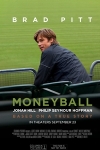
Directed by
Bennett Miller
133 minutes
Rated PG
Reviewed by
Bernard Hemingway

Moneyball
Synopsis: “There’s rich teams and there’s poor teams; there’s 50 feet of crap, then there’s us", says Billy Beane (Brad Pitt) general manager of the Oakland Athletics major leagues baseball team as he and the selection committee face the 2002 season gutted of their key players. With the lowest payroll in the league, somehow Beane has to field a team of contenders. This is the true story of how he did it.If you’re not into sport, don’t be put off by the fact that Moneyball is a sports movie. If you’re into football or cricket, don’t be put off by the fact that Moneyball is about baseball. Ok, it would help to know what “on base” means and what is the difference between home and first base, and I’m sure a knowledge of the game's history and culture would make it more resonant but if you’re interested in the psychology of competitive sport, or just the psychology of winning in general, Moneyball is an involving drama that does more than dish up the standard zero-to-hero sports movie formula.
Executive produced by Scott Rudin, who was behind last year’s Oscar-chomping The Social Network whose writer, Aaron Sorkin, is a co-writer here with Steve Zaillian, and directed by Bennett Miller whose Capote gave Philip Seymour Hoffman the 2005 Best Actor Oscar (he has a small but winning role here as the Athletics coach), Moneyball is, unsurprisingly, also a highly burnished Hollywood production that takes relatively dry material, in this case the application of statistical and mathematical theory to player performance analysis, and gives it a mind and a heart.
If the mind is in the ideas explored by the intelligent script, the heart belongs very much to Billy Beane, a one-time up-and-coming star player who failed to deliver on field and became a talent scout and, eventually, the general manager of the Oakland Athletics. He is a man, in other words, especially American ones, who needs to win and the struggles that he goes through are in many ways more to the film’s fore than the actual on-field contests that his players face. Pitt was the film’s producer and it is fair enough to say that it is his tilt at a Best Actor Oscar (it didn;t happen). Former winner Hoffman is kept well in the background and Pitt’s Beane is given the full-on screen hero makeover – dedicated to his job, a devoted Dad, an exemplary ex (to a one scene-appearing Robin Wright), forthright, stoic, a man of principles, etcetera, etcetera, etcetera. The only other prominent role goes to the ever-likeable Jonah Hill as a kind of Sancho Panza to Beane's Don Quixote.
I’m making Moneyball sound much worse than it is. Yes, it is quintessentially American but it is not Kevin Costner doing his working-class hero schtick. It is a very–well made, but not slick, entertaining, but not superficial, film. Editor Christopher Tellefsen (who also edited Capote and another first class biopic, Milos Forman's Man On The Moon, 1999) impressively integrates the complicated technical stratagems, essential to the contemporary sequence of events, with Beane’s back-story, the on-field action and the archival material into a whole that is demanding enough to over-ride the underlying biopic conventions (apparently the original director, Steven Soderbergh, left the production because he would not adhere to them). And best of all it asks questions but does not provide pat answers.

Want more about this film?


Want something different?




